A worldview or a world-view or Weltanschauung is the fundamental cognitive orientation of an individual or society encompassing the whole of the individual's or society's knowledge, culture, and point of view. A worldview can include natural philosophy; fundamental, existential, and normative postulates; or themes, values, emotions, and ethics.
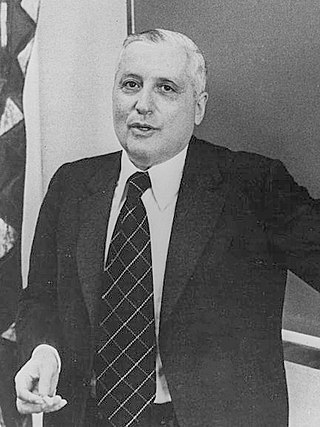
Viscount Ilya Romanovich Prigogine was a Belgian physical chemist of Russian-Jewish origin, noted for his work on dissipative structures, complex systems, and irreversibility.

The Vrije Universiteit Brussel is a Dutch and English-speaking research university located in Brussels, Belgium. It has four campuses: Brussels Humanities, Science and Engineering Campus, Brussels Health Campus, Brussels Technology Campus and Brussels Photonics Campus.
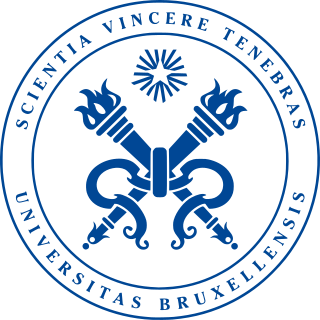
The Université libre de Bruxelles is a French-speaking research university in Brussels, Belgium. ULB is one of the two institutions tracing their origins to the Free University of Brussels, founded in 1834 by the lawyer and liberal politician Pierre-Théodore Verhaegen.
Christian worldview refers to the framework of ideas and beliefs through which a Christian individual, group or culture interprets the world and interacts with it. Various denominations of Christianity have differing worldviews on some issues based on biblical interpretation, but many thematic elements are commonly agreed-upon within the Christian worldview.
Systems philosophy is a discipline aimed at constructing a new philosophy by using systems concepts. The discipline was first described by Ervin Laszlo in his 1972 book Introduction to Systems Philosophy: Toward a New Paradigm of Contemporary Thought. It has been described as the "reorientation of thought and world view ensuing from the introduction of "systems" as a new scientific paradigm".
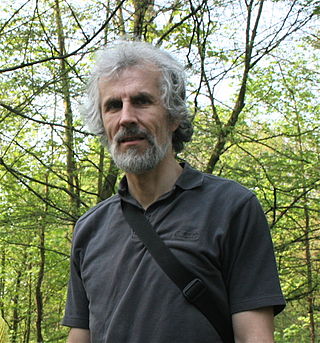
Francis Paul Heylighen is a Belgian cyberneticist investigating the emergence and evolution of intelligent organization. He presently works as a research professor at the Vrije Universiteit Brussel, where he directs the transdisciplinary "Center Leo Apostel" and the research group on "Evolution, Complexity and Cognition". He is best known for his work on the Principia Cybernetica Project, his model of the Internet as a global brain, and his contributions to the theories of memetics and self-organization. He is also known, albeit to a lesser extent, for his work on gifted people and their problems.

The Solvay Conferences have been devoted to preeminent unsolved problems in both physics and chemistry. They began with the historic invitation-only 1911 Solvay Conference on Physics, considered a turning point in the world of physics, and are ongoing.
Jean Paul Van Bendegem is a mathematician, a philosopher of science, and a professor at the Vrije Universiteit Brussel in Brussels.
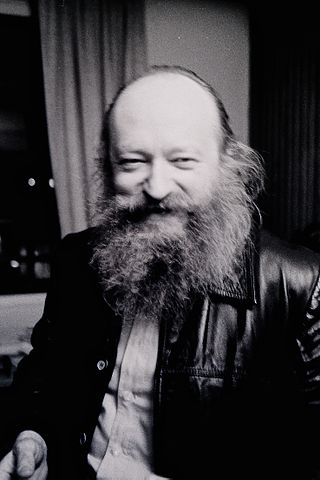
Leo Apostel was a Belgian philosopher and professor at the Vrije Universiteit Brussel and Ghent University. Apostel was an advocate of interdisciplinary research and the bridging of the gap between exact science and humanities.

Marc, Baron Henneaux is a Belgian theoretical physicist and professor at the Université Libre de Bruxelles (ULB) who was born in Brussels on 5 March 1955.
Jeremy Nicholas Butterfield FBA is a philosopher at the University of Cambridge, noted particularly for his work on philosophical aspects of quantum theory, relativity theory and classical mechanics.
Lawrence Paul Horwitz is an American/Israeli physicist and mathematician who has made contributions in particle physics, statistical mechanics, mathematical physics, theory of unstable systems, classical chaos and quantum chaos, relativistic quantum mechanics, quantum field theory, general relativity, representations of quantum theory on hypercomplex Hilbert modules, group theory and functional analysis and stochastic theories of irreversible quantum evolution.
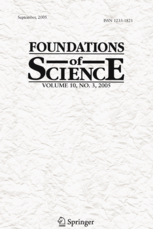
Foundations of Science is a peer-reviewed interdisciplinary academic journal focussing on methodological and philosophical topics concerning the structure and the growth of science. It is the official journal of the Association for Foundations of Science, Language and Cognition and is published quarterly by Springer Science+Business Media. The journal was established in 1995. The editor in chief is Diederik Aerts.
Quantum cognition is an emerging field which applies the mathematical formalism of quantum theory to model cognitive phenomena such as information processing by the human brain, language, decision making, human memory, concepts and conceptual reasoning, human judgment, and perception. The field clearly distinguishes itself from the quantum mind as it is not reliant on the hypothesis that there is something micro-physical quantum-mechanical about the brain. Quantum cognition is based on the quantum-like paradigm or generalized quantum paradigm or quantum structure paradigm that information processing by complex systems such as the brain, taking into account contextual dependence of information and probabilistic reasoning, can be mathematically described in the framework of quantum information and quantum probability theory.
Constantin Piron was a Belgian physicist who worked for most of his career in Switzerland.
Maciej Lewenstein, is a Polish theoretical physicist, currently an ICREA professor at ICFO – The Institute of Photonic Sciences in Castelldefels near Barcelona. He is an author of over 480 scientific articles and 2 books, and recipient of many international and national prizes. In addition to quantum physics his other passion is music, and jazz in particular. His collection of compact discs and vinyl records includes over 9000 items.
Quantum social science is an emerging field of interdisciplinary research which draws parallels between quantum physics and the social sciences. Although there is no settled consensus on a single approach, a unifying theme is that, while the social sciences have long modelled themselves on mechanistic science, they can learn much from quantum ideas such as complementarity and entanglement. Some authors are motivated by quantum mind theories that the brain, and therefore human interactions, are literally based on quantum processes, while others are more interested in taking advantage of the quantum toolkit to simulate social behaviours which elude classical treatment. Quantum ideas have been particularly influential in psychology but are starting to affect other areas such as international relations and diplomacy in what one 2018 paper called a "quantum turn in the social sciences".
Sonja Smets is a Belgian and Dutch logician and epistemologist known for her work in belief revision and quantum logic. She is Professor of Logic and Epistemology at the University of Amsterdam, where she was the director of the Institute for Logic, Language and Computation (2016-2021) and is affiliated with both the Faculty of Science and the Department of Philosophy. She also holds a visiting professor position at the University of Bergen in Norway.
Emmanuel Haven is an academic, author and researcher. He previously held a personal Chair at the University of Leicester (UK) and is currently full professor and the Dr. Alex Faseruk Chair in Financial Management at the Faculty of Business Administration, Memorial University.








